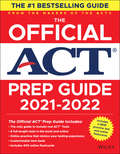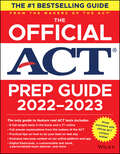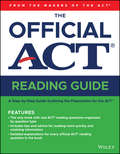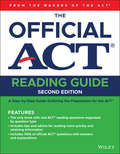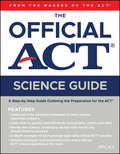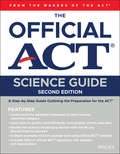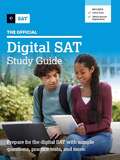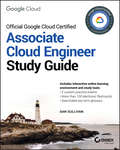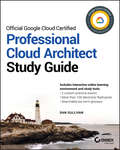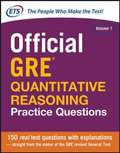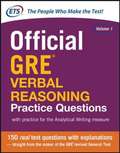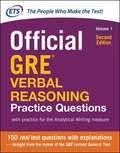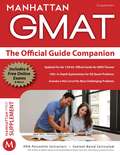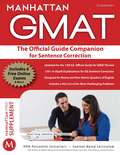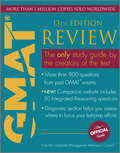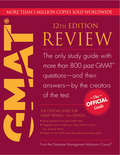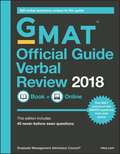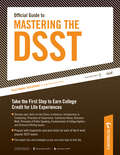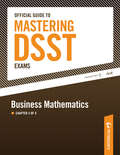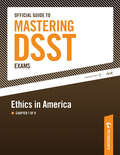- Table View
- List View
The Official ACT Prep Guide 2019-2020, (Book + 5 Practice Tests + Bonus Online Content)
by ACTThe only guide from the makers of the ACT exam, packed with 5 genuine, full-length practice tests and 400 additional questions online This new edition includes: A NEW never-before-seen, full-length practice test with optional writing test (215 questions) 400 online questions that can be filtered and organized into custom practice sets Updated writing prompts and directions Real ACT test forms used in previous years The Official ACT Prep Guide 2019-2020 is the only guide from the makers of the exam and includes actual ACT test forms taken from past ACT exams. This updated edition includes 5 actual ACT tests (all with optional writing test) to help you practice at your own pace and discover areas where you may need more work. The Official ACT Prep Guide 2019-2020 provides detailed explanations for every answer and practical tips on how to boost your score on the English, math, reading, science, and optional writing tests. You’ll also get access to special online bonus content developed with the test taking experience in mind: Practice with 400 additional test questions that can be organized, filtered, and tracked for performance Take a closer look at test day, learn what to expect, and get familiar with the test-taking strategies that are right for you The Official ACT Prep Guide 2019-2020 is your definitive guide to getting ready for the ACT and feeling confident and comfortable on test day!
The Official ACT Prep Guide 2020 - 2021
by ACTThe only guide from the ACT organization, the makers of the exam, with 5 genuine, full-length practice tests in print and online. The Official ACT Prep Guide 2020-2021 is the only guide from the makers of the exam and it includes actual ACT test forms (taken from past ACT exams). It offers 5 actual ACT tests (all with optional writing tests) so you can practice at your own pace. To help you review, this guide provides detailed explanations for every answer and practical tips on how to boost your score on the English, math, reading, science, and optional writing tests. The test creators also created online resources accessible through this book. You can practice online with 5 full length practice tests to mimic the test day experience. These test questions can be organized, filtered, and tracked to test your exam performance. Get ready for test day with this bestselling guide to the ACT. The Official ACT Prep Guide 2020-2021 will help you feel comfortable, confident, and prepared to do your best to ace the ACT! The Official ACT Prep Guide 2020-2021 includes: Information about the September 2020 ACT enhancements Real ACT test forms used in previous years’ exams Five full-length tests available in the book and online, including one NEW full-length test with optional writing test Online practice that mimics the testing experience Customizable questions bank with detailed answer explanations Helpful advice for test day
The Official ACT Prep Guide 2021-2022, (Book + 6 Practice Tests + Bonus Online Content)
by ACTDon’t let your competitors race ahead of you. Get The Official ACT Prep Guide today! The Official ACT Prep Guide 2021-2022 is created by the same people who crafted the ACT. With inside knowledge of the ACT test, the writers of this book packed the guide with practical and useful info to help you ace the test. You’ll learn how to approach each question type on the test and how to read and retain info quickly. In the book, you’ll find answer keys to all the provided sample questions. Unlike other ACT prep guides, this book includes official information from the people who wrote the ACT test. It includes information regarding ACT super scores and more. Gain an edge with six practice tests designed to whip you into peak ACT shape. Don’t waste any more time with guides written by outsiders. The Official ACT Prep Guide 2021-2022 contains all the inside info you need about new additions to the ACT test. The only book with 6(!) official practice tests written by the makers of the ACT Full of advice and suggestions to increase your studying speed Detailed explanations for every answer in the book Includes 400 flashcards online This guide will allow you to do your absolute best on the test of your life. Do not miss out!
The Official ACT Prep Guide 2022-2023
by ACTTHE OFFICIAL ACT® PREP GUIDE 2022-2023 The comprehensive guide to the 2022-2023 ACT® test, with 6 genuine, full-length practice tests in print and online. This 2022-2023 guide includes six actual ACT® tests – all of which contain the optional writing test – that you can use to practice at your own pace. To help you review test subjects and improve your understanding, this guide provides clear explanations for every answer. You’ll also get practical tips for boosting your score on the English, math, reading, and science tests, as well as the optional writing test. Additionally, you can access the six tests online through the access code provided in the guide. The code also provides access to 400 online flashcards to help you prepare for all sections in the ACT® examination. The test’s creators filled this guide with expert advice on how to both mentally and physically prepare for the exam. It will also help you: Review the entire ACT® test content so you’ll know what to expect on test day Understand the procedures you’ll follow when you’re taking the ACT® Prepare for the types of questions you can expect to find on the test Adopt test-taking strategies that are right for you The Official ACT® Prep Guide 2022-2023 is the best resource to prepare you for test day. By using this guide you can feel comfortable that you’re prepared to do your best!
The Official ACT Prep Guide 2023-2024 (Book + Online Course)
by ACTThe comprehensive guide to the 2023–2024 ACT test—including 8 genuine, full-length practice tests. The Official ACT® Prep Guide 2023–2024 book includes six authentic ACT tests—all of which contain the optional writing test—so you get maximum practice before your test date. These full-length practice tests are also available on the Wiley Online Platform and mobile app alongside two additional bonus tests via the PIN code inside, so you can study your official materials anytime, anywhere.* This guide provides clear explanations for every answer straight from the makers of the ACT to help you improve your understanding of each subject. You'll get: Practical tips and strategies for boosting your score on the English, math, reading, science, and (optional) writing tests Eight total practice tests—six in the book, eight online 400+ online flashcards to ensure you’re mastering key concepts A customizable online test bank Expert advice on how to mentally and physically prepare for your test This edition has been updated with a new practice test, new writing samples and prompts, so you can be sure your materials will set you up for success on today's ACT. Through the Official Guide, you'll learn what to expect on test day, understand the types of questions you will encounter when taking the ACT, and adopt test-taking strategies that are right for you. By using this guide and its accompanying expansive resources, you can feel confident you'll be ready to do your best! *Online prep materials valid for one year from PIN code activation.
The Official ACT Prep Guide 2024-2025: Book + 9 Practice Tests + 400 Digital Flashcards + Online Course
by ACTTHE OFFICIAL ACT® PREP GUIDE 2024–2025 The comprehensive guide to the 2024–2025 ACT test—including 9 genuine, full-length practice tests. The Official ACT® Prep Guide 2024–2025 book includes six authentic ACT tests—all of which contain the optional writing test—so you get maximum practice before your test date. These full-length practice tests are also available on the Wiley Online Platform and mobile app alongside three additional bonus tests via the PIN code inside, so you can study your official materials anytime, anywhere. This guide provides clear explanations for every answer straight from the makers of the ACT to help you improve your understanding of each subject. You’ll also get: Practical tips and strategies for boosting your score on the English, math, reading, science, and (optional) writing tests Nine total practice tests—all six in the book are also online with THREE digital bonus tests 400+ online flashcards to ensure you’re mastering key concepts A customizable online test bank Expert advice on how to mentally and physically prepare for your test This edition has been updated with a new practice test, new writing samples and prompts, so you can be sure your materials will set you up for success on your ACT test. Through the Official Guide, you’ll learn what to expect on test day, understand the types of questions you will encounter when taking the ACT, and adopt test-taking strategies that are right for you.
The Official ACT Reading Guide: From The Maker Of The Act
by ACTAre you prepared to do your best on the ACT reading section test? The Official ACT Reading Guide is the only test prep resource created by the makers of the ACT to prepare you for the ACT reading test. This step-by-step guide reviews the entire ACT reading test, allowing you to familiarize yourself with the types of questions you can expect to see on test day. You'll learn tips and advice that will help you do your best, as well as how to approach each question type. Learn how to quickly read and retain information, and see explanations of each question’s answer to improve your performance and gain the confidence you need to succeed! Additionally, the book includes a PIN on the inside front cover that provides access to the full print version and pool of questions online. This offers a customizable learning experience. The Official ACT Reading Guide helps you work toward the score you're targeting and take one major step toward achieving your educational goals! The only book with real ACT reading questions organized by question type Includes tips and advice for reading more quickly and retaining information Detailed explanations for every official ACT reading question in the book With this concept-based guide straight from the makers of the ACT, you know you’re preparing to do your absolute best on the ACT reading.
The Official ACT Reading Guide: Together With Appointments
by ACTThe ACT official subject guides are a step by step guide for outlining the preparation for the ACT section tests. These prep guides provide students a concept-based outline for the subjects they plan to focus on. Each one of the official guides, is an efficient prep tool comprised of the most current and relevant test information packed into one guide. In addition to the book, the entire pool of questions are available online for a customizable learning experience. The ACT official subject guides are the best resource to get detailed input and practice to help you in preparation for the ACT. By using this guide, students can feel comfortable and confident that they are preparing to do their best! Features of the ACT® Official Reading Guide Includes: The only book with real ACT reading questions organized by question type; Includes tips and advice for reading more quickly and retaining information; detailed explanations for every official ACT.
The Official ACT Science Guide: From The Maker Of The Act
by ACTAre you prepared to do your best on the ACT science section test? The Official ACT Science Guide is the only test prep resource created by the makers of the ACT to prepare you for the science ACT test. This step-by-step guide reviews the entire ACT science test, allowing you to familiarize yourself with the types of questions you can expect to see on test day. You'll learn the vocabulary and skills you need to know, as well as how to approach each question type. Learn how to understand graphs and charts, see in-depth examples, and read explanations of each question’s answer to improve your performance and gain the confidence you need to succeed! Additionally, the book includes a PIN on the inside front cover that provides access to the full print version and pool of questions online. This offers a customizable learning experience. With The Official ACT Science Guide helps you work toward the score you're targeting and take one major step toward achieving your educational goals! Understand the detailed breakdown of each science reporting category Learn how to quickly and efficiently read graphs, charts, and data Review the science vocabulary section with words you should know to succeed Study in-depth examples of each passage type using official ACT samples See detailed solutions and explanations for every official ACT science question in the book With this concept-based guide straight from the makers of the ACT, you know you’re preparing to do your absolute best on the ACT science section test!
The Official ACT Science Guide
by ACTThe ACT official subject guides are a step by step guide for outlining the preparation for the ACT section tests. These prep guides provide students a concept-based outline for the subjects they plan to focus on. Each one of the official guides, is an efficient prep tool comprised of the most current and relevant test information packed into one guide. In addition to the book, the entire pool of questions are available online for a customizable learning experience. The ACT official subject guides are the best resource to get detailed input and practice to help you in preparation for the ACT. By using this guide, students can feel comfortable and confident that they are preparing to do their best! Features of the ACT® Official Science Guide Includes: Understand the detailed breakdown of each science reporting category; Learn how to quickly and efficiently read graphs, charts, and data; Review the science vocabulary section with words you should know to success; In-depth examples of each passage type using official ACT samples; Detailed solutions and explanations for every official ACT science question in the book.
The Official Digital Sat Study Guide
by The College BoardThe Official Digital SAT Study Guide™ provides a comprehensive resource for understanding updates to the SAT® in the digital format. It includes four official practice tests―all created by the test maker. As part of College Board’s commitment to access, practice tests are also available in the digital testing platform, Bluebook™, at no charge. However, the guide is the only place to find practice tests in print accompanied by over 300 pages of additional instruction, guidance, and test information.
The Official FFA Student Handbook (Fifteenth Edition)
by National FFA OrganizationThis 15th edition is the Official FFA Student Handbook serving as the member's guide to FFA information and involvement.
Official Google Cloud Certified Associate Cloud Engineer Study Guide
by Dan SullivanThe Only Official Google Cloud Study Guide The Official Google Cloud Certified Associate Cloud Engineer Study Guide, provides everything you need to prepare for this important exam and master the skills necessary to land that coveted Google Cloud Engineering certification. Beginning with a pre-book assessment quiz to evaluate what you know before you begin, each chapter features exam objectives and review questions, plus the online learning environment includes additional complete practice tests. Written by Dan Sullivan, a popular and experienced online course author for machine learning, big data, and Cloud topics, Official Google Cloud Certified Associate Cloud Engineer Study Guide is your ace in the hole for deploying and managing Google Cloud Services. • Select the right Google service from the various choices based on the application to be built • Compute with Cloud VMs and managing VMs • Plan and deploying storage • Network and configure access and security Google Cloud Platform is a leading public cloud that provides its users to many of the same software, hardware, and networking infrastructure used to power Google services. Businesses, organizations, and individuals can launch servers in minutes, store petabytes of data, and implement global virtual clouds with the Google Cloud Platform. Certified Associate Cloud Engineers have demonstrated the knowledge and skills needed to deploy and operate infrastructure, services, and networks in the Google Cloud. This exam guide is designed to help you understand the Google Cloud Platform in depth so that you can meet the needs of those operating resources in the Google Cloud.
Official Google Cloud Certified Professional Cloud Architect Study Guide
by Dan SullivanSybex's proven Study Guide format teaches Google Cloud Architect job skills and prepares you for this important new Cloud exam. The Google Cloud Certified Professional Cloud Architect Study Guide is the essential resource for anyone preparing for this highly sought-after, professional-level certification. Clear and accurate chapters cover 100% of exam objectives—helping you gain the knowledge and confidence to succeed on exam day. A pre-book assessment quiz helps you evaluate your skills, while chapter review questions emphasize critical points of learning. Detailed explanations of crucial topics include analyzing and defining technical and business processes, migration planning, and designing storage systems, networks, and compute resources. Written by Dan Sullivan—a well-known author and software architect specializing in analytics, machine learning, and cloud computing—this invaluable study guide includes access to the Sybex interactive online learning environment, which includes complete practice tests, electronic flash cards, a searchable glossary, and more. Providing services suitable for a wide range of applications, particularly in high-growth areas of analytics and machine learning, Google Cloud is rapidly gaining market share in the cloud computing world. Organizations are seeking certified IT professionals with the ability to deploy and operate infrastructure, services, and networks in the Google Cloud. Take your career to the next level by validating your skills and earning certification. Design and plan cloud solution architecture Manage and provision cloud infrastructure Ensure legal compliance and security standards Understand options for implementing hybrid clouds Develop solutions that meet reliability, business, and technical requirements The Google Cloud Certified Professional Cloud Architect Study Guide is a must-have for IT professionals preparing for certification to deploy and manage Google cloud services.
Official GRE Quantitative Reasoning: Practice Questions, Volume 1
by Educational Testing ServiceThis book provides important information about the Quantitative Reasoning measure of the GRE revised General Test, including the knowledge and skills that are assessed and the types of questions that appear.
Official GRE Verbal Reasoning Practice Questions (Volume #1)
by Educational Testing Service Staff150 REAL GRE Verbal Reasoning questions--direct from the test maker! The best way to prepare for the Verbal Reasoning measure of the GRE revised General Test is with real GRE test questions--and that is what you will find in this unique guide! Specially created for you by ETS, it offers 150 actual GRE Verbal Reasoning questions with complete explanations. Plus, this guide includes an authoritative overview of the GRE Analytical Writing measure, completewith sample writing tasks and scored sample responses. Only ETS can show you exactly what to expect on the test. So for in-depth practice and accurate, reliable test preparation for the GRE Verbal Reasoning measure, this guide is your best choice! Look inside to find: Real GRE Verbal Reasoning test questions arranged by question type and difficulty level--to help you build your test-taking skills. Plus, mixed practice sets. Answers and explanations for every question! ETS's own test-taking strategies: Valuable hints and tips that can help you do your best on the test. Official information on the GRE Verbal Reasoning measure: The facts about test content, structure, and scoring--straight from ETS. Plus: An overview of the GRE Analytical Writing measure with writing strategies, sample writing tasks, and sample scored essays.
Official GRE Verbal Reasoning Practice Questions (Second Edition)
by Educational Testing ServiceThe best way to prepare for the Verbal Reasoning measure of the GRE® General Test is with real GRE test questions--and that is what you will find in this unique guide. Specially created by the actual test maker, it offers 150 actual GRE Verbal Reasoning questions with complete explanations. This guide also includes an authoritative overview of the GRE Analytical Writing measure, complete with sample writing tasks and scored sample responses.
Official Guide Companion
by Manhattan GmatThis book is designed to be used in conjunction with the Official Guide for GMAT Review, 2015 and 13th Editions. In the Official Guide Companion, each math question is broken down and explained by our expert instructors, who not only have 99th percentile scores, but years of experience teaching the GMAT. The explanations in this book provide detailed, step-by-step approaches to every Problem Solving and Data Sufficiency question in the Official Guide. Where appropriate, The Official Guide Companion also details more than one way to arrive at the solution. And perhaps most importantly, all explanations are accessible and provide a framework for answering the particular question as well as similar questions you may see on the real test. Purchase of this book includes six months of online access to 6 full-length, computer-adaptive practice exams and GMAT Navigator.
Official Guide Companion for Sentence Correction
by Manhattan GmatThe Official Guide Companion for Sentence Correction is designed to be used in conjunction with the Official Guide for GMAT Review, 2015 and 13th Editions. Written by Manhattan GMATâ TMs 99th-percentile instructors, this book breaks down and explains each of the 140 sentence correction problems contained in the GMAT Official Guide in a clear and simple manner accessible to students of all ability levels. The explanations in this book focus in on the solving process and work to emphasize the connection between sentence meaning, structure, and correct grammar. Furthermore, all explanations align with the methodology and grammar rules taught in Manhattan GMATâ TMs complete courses and provide a framework for answering any sentence correction questions you may see on the real test. Purchase of this book includes six months of online access to 6 full-length, computer-adaptive practice exams and GMAT Navigator.
The Official Guide for GMAT Review
by GMACThe most trusted source for studying the GMAT test, written by GMAC - the creators of the exam. The Official Guide to the GMAT, 13th Edition is the most up-to-date study guide for the GMAT test, containing 50 official questions from the new Integrated Reasoning component which was fully integrated into the test in June 2012. Because this component is more interactive than other core components in the GMAT exam (Verbal, Quantitative, and Analytical Writing), the Integrated Reasoning practice questions will be housed on a companion website that readers will be able to access after purchasing the book*. Includes: More than 900 questions from past GMAT exams Diagnostic section helps you assess where to focus your test-prep efforts Full answers and detailed explanations for practice questions Grammar review covering concepts tested in the GMAT Verbal section Comprehensive math review of the topics tested in the GMAT Quantitative section Actual essay topics, sample responses and scoring information Questions organized in order of difficulty to save study time Don't settle for anything less when studying for the GMAT test, purchase the Official Guide today. *To use the Integrated Reasoning companion website, you must have one of the following browsers: Safari, Google Chrome, Firefox, or Internet Explorer version 7 or higher.
The Official Guide for GMAT Review
by Graduate Management Admission CouncilTrust the worldwide bestselling study guide to help you prepare for the GMAT!The Official Guide for GMAT Review - 12th EditionHere's what you'll find inside the only book on the market written by the creators of the exam.More than 800 questions from past GMAT tests - including 250 that have never before been publishedFull answers and detailed explanations for all questionsGrammar review covering concepts tested on the GMAT Verbal sectionComprehensive math review of the topics tested on the GMAT Quantitative sectionActual essay topics, sample responses, and scoring informationQuestions organized in order of difficulty to save study timeAlso available:The Official Guide to GMAT Quantitative Review, 2nd EditionThe Official Guide to GMAT Verbal Review, 2nd Edition
The Official Guide For GMAT Verbal Review 2018
by Graduate Management Admission Council (GMAC) StaffA supplement to the Official Guide with 300 additional verbal questions The GMAT Official Guide 2018 Verbal Review provides additional practical preparation focused on the verbal portion of the exam. Written by the Graduate Management Admission Council, this guide contains 300 real GMAT questions from past exams, including 45 never-before-seen questions, plus the following features: An overview of the exam to help you get familiar with the content and format Comprehensive grammar review Detailed answer explanations that explain how the test maker thinks about a question Questions organized in order of difficulty from easiest to hardest to focus your study Access to the same questions online at gmat. wiley. com, where you can build your own practice sets Don't waste time practicing on fake GMAT questions. Optimize your study time with the GMAT Official Guide 2018 Verbal Review using real questions from actual past exams.
Official Guide to Mastering DSST Exams
by Peterson’sPeterson's Official Guide to Mastering the DSST Exams helps nontraditional students earn college credits for life and learning experiences, with diagnostic tests, subject review, and post-tests (with detailed answer explanations) for each of the 8 most popular DSST exams: Ethics in America, Introduction to Computing, Principles of Supervision, Substance Abuse, Business Math, Principles of Public Speaking, Fundamentals of College Algebra, and Technical Writing. Peterson's Official Guide to Mastering the DSST Exams is the only prep guide endorsed by PrometricTM, the DSST program provider, which found this study guide to be an excellent reflection of the content of the respective DSST tests.
Official Guide to Mastering DSST Exams--Business Mathematics: Chapter 5 of 8
by Peterson's"A part of Peterson's Official Guide to Mastering the DSST Exams--Business Mathematics helps nontraditional students earn college credits for life and learning experiences, with a diagnostic test, subject review, and post-test (with detailed answer explanations) for this popular DSST exam: Business Mathematics. Topics covered include algebraic concepts, statistics, business applications, and financial mathematics. Peterson's Official Guide to Mastering the DSST Exams is the only prep guide endorsed by PrometricTM, the DSST program provider, which found this study guide to be an excellent reflection of the content of the respective DSST tests."
Official Guide to Mastering DSST Exams--Ethics in America: Chapter 1 of 8
by Peterson's"A part of Peterson's Official Guide to Mastering the DSST Exams--Ethics in America helps nontraditional students earn college credits for life and learning experiences, with a diagnostic test, subject review, and post-test (with detailed answer explanations) for this popular DSST exam: Ethics in America. Topics include ethical traditions, religious traditions, natural law theory, political theories, transcendentalism idealism, moral egoism, feminist ethics, current ethical issues, and more. Peterson's Official Guide to Mastering the DSST Exams is the only prep guide endorsed by PrometricTM, the DSST program provider, which found this study guide to be an excellent reflection of the content of the respective DSST tests."


